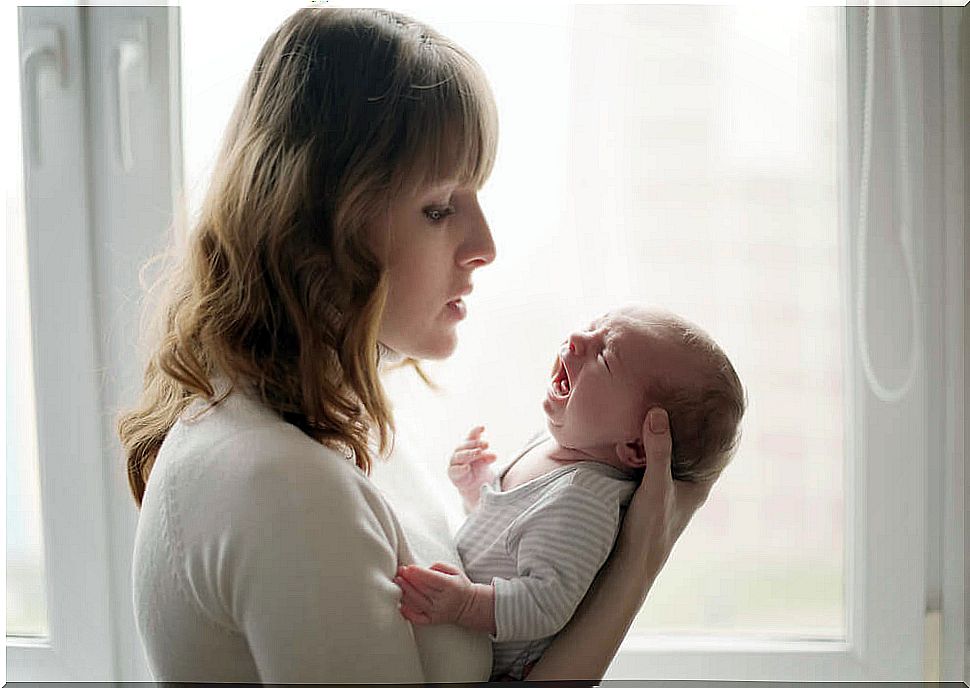What Should I Do If My Baby Refuses To Breastfeed?

Breastfeeding is very important for all newborns. Breast milk is a unique food that is specially designed to nourish the baby. But what if your baby refuses to breastfeed?
This is something, which can happen, and you should not feel bad about it. There are some reasons that you need to know to remedy the situation.
Why is breastfeeding so important? We’ll tell you that. According to the Spanish Association of Pediatricians (AEPED), it has several benefits. These include emotional well-being, reduced risk of breast and ovarian cancer and postpartum recovery.
When a baby refuses to breastfeed, all of these benefits are set aside as many mothers end up being disillusioned. It does not help that they do not know what is going on. So let’s try to figure it out.
What is a “breastfeeding strike” or “breastfeeding crisis”?
The fact that a baby denies its mother’s breast is called a “breastfeeding strike” or “breastfeeding crisis”. However, this term is only valid if it lasts a long time.
No matter how much you offer to breastfeed your baby, and no matter how hungry the baby is, he or she will still refuse to breastfeed. We know it’s frustrating, but there’s a reason for this reaction.
Are you back at work and spending less time with your child? Has your baby ever bitten your nipple, and have you pushed him or her away abruptly or responded with a scream? Are there any teeth?
These questions can be crucial.
What can bother the child?
There are several things that you may not be aware of that bother a child. These can be the reason why your baby refuses to breastfeed. Knowing them will give you great relief. Here in the article we also give you some tips on how to solve them.

Ambient noise
It may seem insignificant, but when breastfeeding your baby, it is best to be in a quiet place without too much noise. Excessive noise and people around make the baby reject the breast.
My baby refuses to breastfeed: Nasal congestion
It is important to make sure that your baby’s nostrils are free. If babies can not breathe well, they can not suck and it makes them reject the breast because they already know what will happen. Then use a nasal aspirator for children.
Changes in routines
If you have started working and it has meant a change in routines, the baby may react by refusing the breast. It’s like their way of complaining and protesting when they dislike something. The same can happen if you have recently moved.
Smell
If your baby refuses to breastfeed and none of the above fits the possible causes, try to see if you have changed shampoo, soap or perfume. Babies can reject new odors and this means that they will not breastfeed.
Too little milk
Another reason why the baby may refuse the breast is the milk production. The baby may not be able to meet its nutritional needs, and this may cause it to react with early weaning, as stated in AEPED.
Unpleasant past experience
One of the last possible reasons why your baby refuses to breastfeed may be related to an unpleasant experience. Pain in the mouth during breastfeeding because they got teeth, or a scream from your side because they had bitten you.
How can I try to help?
There are different ways to break this breastfeeding crisis. We can not assure you that they will all work for you, as each case is different. But why not give it a try?
Here are some options.
Do not pressure your child
We will dedicate a section to this because it is important. It is a mistake to force your baby to return to the breast. Let them start again when they feel ready.
A good way to do this is by strengthening the skin-to-skin contact. In the bathtub or in the bed, make sure that this tape lasts as long as necessary. This simple action can make the baby start sucking again.
Use a baby carrier if your baby refuses to breastfeed
Although strollers are very comfortable, a sling can be a good means of resolving this situation. It will be close to your breast, and if your baby is in contact with your skin, it is even better. If he or she is getting hungry, the breast is right nearby, then why not try it?
Choose a quiet environment if your baby refuses to breastfeed
If the possible reason your baby refuses to breastfeed is noise or distractions, try a calmer environment. A room or area where there are not too many people and where everything is quiet. It may be the solution you need.

Take another position if your baby refuses to breastfeed
This can be a great way to encourage your baby to breastfeed without forcing it to take up certain positions. Eg. in sitting position. Try it, because maybe what does not suit them is just the usual position.
Offer your baby the breast while sleeping
This is a good technique to get the baby to breastfeed. They do it automatically. When they are about to fall asleep, they will be calm and relaxed. Lie down next to your baby in a skin-to-skin position.
Do not let your baby be hungry
If your baby is hungry, it will be much more irritable and more likely to refuse breastfeeding. So we suggest you avoid this situation. The best thing you can do? Offer them the breast when it’s time, even if they do not want it.
If the baby refuses to breastfeed, there are ways to address it
Never remember to force your baby to breastfeed and that it is important to keep in mind all the tips we mentioned here. First and foremost, remember skin-to-skin contact.
Newborns are very sensitive to any change in routines or schedules. In any case, do not hesitate to consult your pediatrician. They will definitely know your case better and can give you personalized recommendations.









